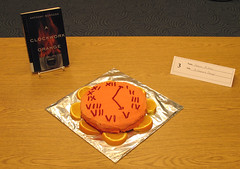
My wife bought this book by Elizabeth Wayland Barber and Paul T. Barber and I promise I will let her read it as soon as I am done with it. That's the generous kind of person I am. She may be tired of it by then, since I have been reading her big chunks of it as I go. It's that kind of a book.
When They Severed Earth From Sky is about myth seen thorugh the lens of cognitive psychology. In another words, mythology sticks in our heads because of the way our brains work.
Start with a couple of simple assumptions. A pre-literate society only knows what it's members can remember, so important information has to be passed on in memorable ways. A story is more memorable than a list of observations. A
wild story is more memorable than an everyday one.
We all know that some myths are attempts to explain natural events. I remember at age 10 reading in D'aulaire's wonderful
book of Greek myths that Hephaestus, the god of blacksmiths had a foundry under Mount Aetna. Nobody had to tell me that was an attempt to explain a volcano.
But what the Barbers emphasize is that these explanations are not
silly. Humans are hardwired to try to understand their surroundings and, lacking scientific tools or theories, they worked with what they understood: Willfullness.
If something happened, someOne caused it to happen.In fact, mythology turns out to be embarassingly full of volcanos when you start looking for them. (One-eyed giants who throw mountaintops, monsters with snake-like hair that turn men to stone, etc.).
The Barbers offer about forty principles for examining myths (and repeat them in a convenient appendix). I pick one at random: "If certain events are not understood, according to already known ("natural") principles, they must be un-understandable - that is, "super-natural" - and there is no point in trying to understand them." They drily call this one the "UFO Corollary."
The Barbers' tools are powerful enough that they can make and test predictions. For example, they look at an old story related in Homer about many of the gods coming together for an event, and they conclude that it represents an unusual alignments of the planets who bear the names of those gods. Using planetarium software they went searching for that alignment and found it in February 1923 B.C. -
one thousand years before Homer. Apparently myths can carry information for a
long time.
As the above indicates the Barbers have a lot to say about myths and the stars. They argue that the flood stories found in many parts of the world are actually about the ocean above us and represent the precession - movement of the sun in the Zodiac over thousands of years, with each shift being the creation of a "new world." They don't mention that the Navahos, far from any ocean, nonetheless have a story of their ancesters moving to new worlds three times. A different mnemonic for the same observation?
In this book you will discover why Prometheus and Loki are both chained to rocks by the gods, why in Andean flood tales the fox gets his tail wet, and what dragons
really look like. I highly recommend it.









